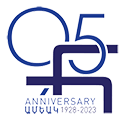
“Artsakh is a different world; God’s breath is everywhere.” Rita Khachoyan quoted these words from the Artsakh-Armenian poet and prose writer Vardan Hakobyan in welcoming guests to the evening, “Artsakh in Armenian Literature,” organized by Hamazkayin through its Toronto Chapter Literary Committee, Torontohay Monthly reports. The evenings have been a fixture since 2012, led by Tamar Donabedian. The purpose is to bring young Armenians closer to Armenian literature and light a flame of love toward Armenian language and literature.
The event, held on September 15, 2024, started with an interpretation of the Artsakh anthem by Armineh Torikian. “Azat u ankakh Artsakh” (Free and independent Artsakh) was written by Hakobyan and adopted as the national anthem on December 23, 1994. Ms. Torikian also discussed the River Tartar and the mountains Mrav and Kirs, mentioned in the anthem.
Haig Harutiunian and Hrag Karamardian then presented Hakobyan’s ode “Artsakh.” The talented young Mosig Danadian shared information about Artsakh poet and prose writer Vazgen Ovyan and recited his poem “Hairenik.” Alik Baboghlian presented the same poet’s poem “Artsakh,” written in 1962.
Spirits were lifted by members of the Hamazkayin “Hay Asdgher” Choir Patil Sarkis and Nare Hakhnazarian, who sang “Hayastan im Chknagh” (My glorious Armenia), composed by Artur Grigoryan, whose family was from Artsakh. The lyrics are by Maria Minasian. The voice coach and conductor Hripsime Tovmasian was thanked.
Hermine Avakyan, a prose writer and poet from Artsakh, serves as the director of the Hamazkayin Artsakh Office. From her unpublished diary, “Im u ko paterazme” (My and your war), the piece “Zinvorneri hamar lavash enk tkhum…” (We are baking lavash for the soldiers) was interpreted by Gabriella Batigian. Then Mr. Harutiunian recited Ms. Avakyan’s poem “Yer yerkar spasetsi khaghaghutiane” (I waited long for peace), written on November 11, 2020.
Mr. Harutiunian also presented a work by Hayaser Hovsepyan, a martyr of the 44-Day War, beginning with the piece, “Aistegh amen mi kar lur patmaban e…” (Here, every stone is a silent historian).
Ms. Baboghlian presented Ms. Avakyan’s “Yes galis em kez mod glkhabats” (I approach you bareheaded), a heartrending ode to Shushi. Then the audience heard Gurgen Gabrielyan’s song, “Artsakhi horovel,” which has a special place in Armenian music.
Mr. Karamardian recited “Shushi,” by Vardan Petrosyan, written on November 15, 2020. The talented young Toronto-Armenian Lara Der Minasian recited Vehanoush Tekian’s “Artsakh” and Ms. Baboghlian recited “Incher g’esen…” (The things they say) by Garo Armenian.
Shant Deokmejian read Panos Djeranian’s “Dadiavank” as well as “Mtnshaghi karmir tsherin” (To the red cheeks of dusk) by Martuni native Nemrut (Sergei Safaryan). He noted that the two authors are covered in the Hamazkayin literary journal Pakine.
Ms. Khachoyan made reference to Mikayel Hajian’s articles. The author’s two sons are martyred heroes. She read a brief excerpt from Norek Gasparian’s article, “Aghed” (Catastrophe). Ms. Batigian presented Vitali Petrosyan’s “Karotabaghdzutyun,” written on December 22, 2020.
Of some interest was Mr. Deokmejian’s intervention about Armen Avo, whom he had met during the 2024 Hamazkayin Forum in Armenia. Mr. Avo is a young writer who fought in the 44-Day War; his brother was a martyr in that war. The speaker read Mr. Avo’s poem, “Artsakh.”
Satire has a special place in Artsakh literature. Ms. Khachoyan spoke about “Chanad e tzur” (Your chin is crooked) and “Yete aidpes liner” (If it were so) by the humorist Pele Pugh. Ms. Avakyan had prepared a video especially for the evening, and it was shown next. Ms. Baboghlian wrapped up the evening with a reading of Ms. Avakyan’s “Yes lats chegha kez hamar, yerkir” (I did not cry for you, land).
Ms. Torikian invited all the participants to the stage and presented them with books on behalf of the executive board. It was noted that Mr. Karamardian had spared no effort to make the evening a success. Ms. Donabedian said a few words in closing, noting that she had brought the map on display from Tigranakert in Artsakh.
There was a reception with coffee and pastries.
Rita Khachoyan


